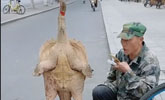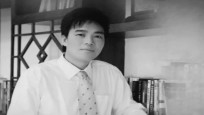英国诗人李道:语言就是希望,我们通过诗歌进入当下
2016年10月22日 17:20
来源:凤凰文化
背景、语言、国籍不同的作家诗人的交流,是一个宏大得多的过程的一部分,那就是个人与民族之间的融汇,世界的面貌正在因此而发生着积极的改变。
凤凰文化讯10月21日晚八点,由凤凰网、鼓浪屿管委会、厦门文学艺术界联合会主办,凤凰文化、凤凰厦门承办的“2016凤凰•鼓浪屿诗歌节”将在鼓浪屿盛大开幕。这是鼓浪屿第一次举办专业性的国际诗歌节。诗歌节期间将举办一系列的诗歌论坛、采风、诗歌朗诵会、跨界音乐会等活动,旨在以诗歌为载体,促成一次东西方、两岸三地之间的文化交流。

英国诗人李道(Richard Berengarten)
李道(Richard Berengarten),1943年出生于伦敦。作为一个多面的诗人和一个富于奉献精神的国际主义者,他曾经生活在意大利、希腊、前南斯拉夫和美国。他出版了包括《蓝蝴蝶》(The Blue Butterfly, 2006)和《手册》(Manual, 2014)在内的30多部著作,获得过众多文学奖项。他的诗歌已经被翻译成96种文字。最近他完成了名为《易》(Changing)的鸿篇巨制,这是一部向《易经》致敬的作品(将于2016年出版)。这部著作将有海外学者、世界一流的《周易》研究专家爱德华·邵倪曦(EdwardShaughnessy)教授代为前言。李道于1975年发起创办了如今享有盛名的国际“剑桥诗歌节”,他还于2015年在剑桥协办了首届“徐志摩诗歌节”。
以下为李道的致辞(中英文):
It is an enormous pleasure to be invited to speak here on behalf of the guests and visitors at this openingceremony of the Xiamen International Poetry Festival on Kulangsu Island. As you know, this is the seventhpoetry festival here,but the first time that the event has been international. I am delighted tospeak for fourteen poets from eleven countries, who have travelled thousands ofmiles to take part in this inspiring literary celebration onthis beautiful and historic island. Onbehalf of us all, I would like to thank you, our three organisational hosts,most profoundly –– namely, the Administrative Committee of Kulangsu, the iFungInternational Website, and the Literature and Arts Association of Xiamen – foryour kindness and hospitality in welcoming us here. And among all those whohave worked so hard to realise this fine event, I would also especially like torecord thanks to five individuals: to Lian Jianyong, Deputy Governor of FujianProvince; to Ye Chonggeng,Minister of the Xiamen Municipal Council; to Zou Ming, Editor-in-Chief of the iFung Website; to Shu Ting, famous poet and daughter of Kulangsu; and to the distinguishedpoet and critic, Professor Chen Zhongyi.
我很荣幸受邀在鼓浪屿国际诗歌节上代表各位嘉宾和来宾致辞。各位都知道,这已经是第七届在这里举办的诗歌节了,但却是第一次国际诗歌节。我很高兴能代表来自11个国家的14位不远万里,来到这个历史悠久的美丽岛屿参加此次文学盛会的诗人讲话。在此,我谨代表所有来到的外国诗人对三家主办方——凤凰网、鼓浪屿管委会和厦门市文学艺术界联合会——表示诚挚的谢意,感谢他们的热情款待。在所有为活动成功举办而付出辛劳的人中,我要特别感谢福建省副省长梁建勇、厦门市委常委叶重耕、凤凰网总编辑邹明、生养在鼓浪屿的著名诗人舒婷,以及知名诗人与批评家陈仲义教授。
As we all know, poetry flourishes today in China in myriadforms and styles, and an international spirit of welcome and hospitality towriters is blossoming throughout your country. The art of poetry in China is asrich and varied today as it always has been, and what is more, during the lasttwenty-five years it has grown increasingly open, thanks to the work ofinternationally famous Chinese writers, as well as more recent talents inChina, who have been keenly taking in influences not only from your greatnative poetic tradition, but also from poets from many other languages andcultures. And just as poets from other countries are welcomed here, Chinesepoets regularly take part in international events all over the world. In thelast few years, I have had dialogues with Chinese poets at internationalfestivals in Belgrade (Serbia), Ohrid (Macedonia), and most recently, last yearin my own city, Cambridge, England – where I happily met Shu Ting. This was atthe very first poetry Anglo-Chinese poetry festival dedicated to the great poetXu Zhimo, whose lyric poem ‘Leaving Cambridge Again’ is learned by everyChinese schoolchild.
众所周知,当代中国诗歌形式繁多,兴旺发达,全国各地都对外国作家的作品持欢迎接纳的精神。当代中国诗歌艺术丰富多样,一如往昔;不仅如此,最近25年来,由于众多国际知名中国诗人的作品,以及致力于传承本土诗歌传统,吸收其他语言文化精髓的年轻诗人的努力,中国诗歌日益开放。最近几年来,我在贝尔格莱德(塞尔维亚)、奥赫里德(马其顿)的国际诗歌节上与中国诗人进行过对话。不久前,我在英国剑桥还很高兴地见到了舒婷。当时正值第一届中英徐志摩纪念诗歌节,每一位中国学童都学过这位伟大诗人的抒情诗《再别康桥》。
We all know of course that exchange among poets and writers ofdifferent backgrounds, languages and nationalities is part of a much hugerprocess of integration and harmonisation between people and peoples that istoday positively changing the face of the world. Of course, this process ofinternationalisation, of creative and imaginational communication, has been happeninggradually since the end of the Ming dynasty and the start of the Qing, in thelate seventeenth century. It now proceeds at a pace that is so stupendouslyfast that it often leaves us breathless.
背景、语言、国籍不同的作家诗人的交流,是一个宏大得多的过程中的一部分,那就是个人与民族之间的融汇,世界的面貌正在因此而发生着积极的改变。当然,自从17世纪末的明末清初时期开始,这一创造力与想象力交流的国际化进程就已经渐渐生根发芽。现在,它更以令人屏息的速度向前迈进。
Poetry, which is based on breath (on rhythm, on qi, on inspiration) gives us needed space and time to absorb andassimilate these changes – and also both to celebrate and criticise them. By now, we have all learned one great truth and one greatimperative. The truth is that we are part of one single great, unstoppable,flow of humanity – of human ideas and intelligence, of human knowledge andculture, of human passions and energies – wherever we come from, no matter whatour language, ethnicity, nationality, belief system, economic condition, age orgender. And the imperative we have learned is: to learn from one another, reciprocally and patiently, carefullyand quietly, joyfully and imaginatively. There is no other way. InEnglish, the words guest and host come from the same root. And inother languages, like French and Italian, the word is identical (hôte, ospite).The French pholoopher Emmanuel Levinas said: “Language is hospitality.” Let meadd: “Language is hope.” The future and the past call us now, into this now, into thispresent, through poetry – guests and hosts alike. So let the festival begin.
以气为本的诗歌,赋予了我们时间和空间去吸收接纳这些变化,同时也在赞颂它,批判它。时至今日,我们都已经学到了一条重要的真理,和一项重要的责任。这条真理就是:我们都是同一个宏大的、不可阻挡的人类前进洪流的一份子,包括人类的思想与智慧,知识与文化,激情与力量——不管我们从何而来,也不管语言、种族、民族、信念体系、经济状况、年龄或性别有何种差异。我们学到的责任是:要耐心、认真、沉静地互相学习,这是一个快乐的过程,也是富有想象力的过程。我们别无出路。在英语中,guest(客人)和host(主人)的词根是一样的;而在法语和意大利语等语言中,两个意思用的是同一个词(hôte, ospite)。法国哲学家伊曼努尔·列维纳斯说过:“语言就是招待。”我现在要加上一句:“语言就是希望”。未来和过去都在召唤着我们,通过诗歌进入现在,进入当下,无论主客。所以,让诗歌节开幕吧。 

[责任编辑:冯婧 PN041]
责任编辑:冯婧 PN041
- 2好文

- 0钦佩

- 0喜欢

- 0泪奔

- 0可爱

- 0思考


凤凰文化官方微信
视频
-

李咏珍贵私人照曝光:24岁结婚照甜蜜青涩
播放数:145391
-

金庸去世享年94岁,三版“小龙女”李若彤刘亦菲陈妍希悼念
播放数:3277
-

章泽天棒球写真旧照曝光 穿清华校服肤白貌美嫩出水
播放数:143449
-

老年痴呆男子走失10天 在离家1公里工地与工人同住
播放数:165128
图片新闻























